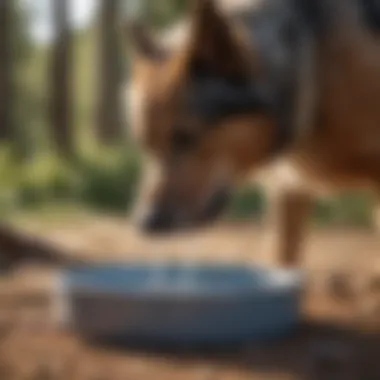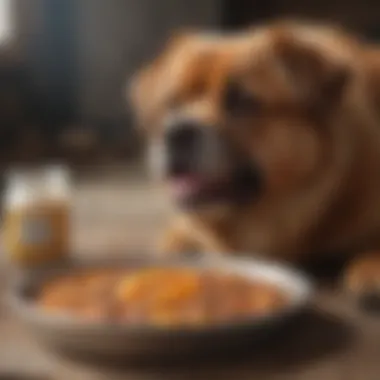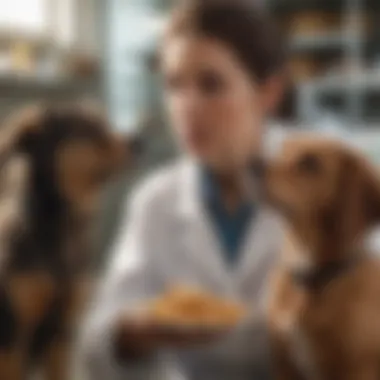Essential Dietary Guide for Dogs with Diarrhea


Intro
Dealing with a dog experiencing diarrhea can be a distressing experience for any pet owner. This health issue can arise from a variety of causes, ranging from dietary indiscretion to infections. Understanding what to feed your dog during such times is crucial. Adjusting their diet can aid in recovery and help maintain hydration. This article aims to equip dog owners with knowledge about suitable foods, hydration strategies, and the importance of consulting with a veterinarian when necessary.
Animal Profile
General Overview
Dogs, as domesticated animals, depend heavily on human guardianship for their nutrition and health. Unlike their wild ancestors, the modern dog has a varied diet that can influence their digestive health. When dealing with diarrhea, it is essential to consider what food is best suited for recovery. More than just a stomach issue, diarrhea can lead to dehydration, which can be life-threatening if not managed properly.
Habitat and Distribution
Dogs are found globally, inhabiting homes, farms, and various terrains. Their adaptability means that diet can vary significantly based on locale and available foods. Understanding local dietary habits and foods can help in managing a dog’s health during gut disturbances.
Care Tips for Pet Owners
Basic Needs and Requirements
When your dog suffers from diarrhea, focus on bland, easily digestible foods. Options might include:
- Boiled chicken (no skin or bones)
- White rice
- Pumpkin puree (not the spiced pie filling)
- Cottage cheese
Ensure to introduce these foods gradually to avoid further upset. Avoid any high-fat or highly spiced foods as these can worsen the condition.
Health and Wellness Tips
Hydration is critical when managing a dog with diarrhea. Encourage consumption of water regularly. If a dog refuses water, consider offering:
- Chicken broth (low sodium)
- Electrolyte solutions designed for pets
Monitor your dog's condition closely. If diarrhea persists for more than a day or is accompanied by other symptoms like vomiting or lethargy, a consultation with a veterinarian is necessary.
Consult with a veterinarian to rule out underlying issues, particularly if your dog experiences recurrent diarrhea.
Culmination
Understanding proper feeding strategies during episodes of diarrhea can help expedite recovery and maintain your dog's overall health. The knowledge of suitable food options, the importance of hydration, and the necessity for veterinary advice forms the basis of effective care during such instances. Careful monitoring and responsible decisions will not only aid recovery but also enhance the overall wellbeing of your canine companion.
Understanding Diarrhea in Dogs
Understanding diarrhea in dogs is essential for pet owners, veterinarians, and anyone involved in animal care. This condition can indicate a variety of underlying health issues, from dietary indiscretions to serious infections. Having a clear grasp of the triggers and implications will help ensure appropriate actions are taken promptly.
Recognizing different types of diarrhea, their causes, and accompanying symptoms can guide owners in making informed nutritional and medical decisions. Knowledge about diarrhea helps in early identification of serious conditions that may warrant veterinary intervention. A proactive approach to understanding and addressing diarrhea can lead to more effective care, ultimately benefiting the dog's health and well-being.
Types of Diarrhea
Diarrhea is not a single condition; it presents in different forms. Generally, it can be classified into two main types: acute and chronic. Acute diarrhea occurs suddenly and may last for a short period, often resolving without intervention. This type can stem from causes like sudden dietary changes, infections, or stress. Chronic diarrhea, on the other hand, persists for weeks or longer. It often suggests ongoing health concerns and requires a deeper investigation into potential dietary triggers or more serious medical issues.
Understanding these distinctions is vital. Acute diarrhea may not always need drastic dietary changes, while chronic diarrhea often demands careful monitoring and adaptation of the dog's diet to manage the underlying problem.
Common Causes of Diarrhea
A diverse range of factors can contribute to diarrhea in dogs. Some common causes include:
- Dietary indiscretion: Consuming spoiled food or non-food items can lead to upset stomachs.
- Infections: Bacterial, viral, or parasitic infections can disrupt a dog’s digestive system, resulting in diarrhea.
- Allergies or sensitivities: Certain ingredients in dog food can trigger intestinal upset, leading to diarrhea.
- Medications: Some medications might have gastrointestinal side effects, contributing to loose stools.
- Stress: Changes in environment or routine can induce stress-based diarrhea in sensitive dogs.
Understanding these causes helps owners adopt preventative measures, reducing the chances of diarrhea occurring in the first place.


Symptoms Accompanying Diarrhea
Diarrhea in dogs often does not occur in isolation. It commonly presents alongside other signs that can give more clarity about the dog's overall condition. Common symptoms that may accompany diarrhea include:
- Vomiting: This can be a sign of a more serious underlying issue.
- Lethargy: A noticeable decrease in energy levels may indicate that the dog is not feeling well.
- Loss of appetite: Dogs with diarrhea might show reduced interest in food, complicating nutritional needs.
- Abdominal pain: Signs of discomfort may occur, affecting the dog’s behavior.
Recognizing these symptoms is crucial in delivering timely and adequate care. Monitoring the dog’s condition can reveal when reassurance is adequate, or when it is time to consult a veterinarian.
Knowing what to feed your dog during diarrhea is not just about managing the immediate symptom; it's about understanding and addressing the root cause effectively.
Initial Steps When Your Dog Has Diarrhea
Understanding what to do when your dog has diarrhea is crucial. This section outlines the necessary steps to take. Early actions can significantly affect the recovery process. A well-planned response helps in identifying the issue's severity and determining the need for professional consultation.
Assessing Severity of Diarrhea
The first step is to assess the severity of your dog’s diarrhea. Diarrhea can range from mild, infrequent loose stools to severe, continuous episodes. Consider the following factors:
- Frequency: How often is your dog experiencing diarrhea? Occasional incidents may warrant observation, while frequent occurrences demand more attention.
- Stool Consistency: Pay attention to the consistency. Watery stools may indicate a more significant issue than softer yet formed stools.
- Additional Symptoms: Look for other signs, such as vomiting, lethargy, or loss of appetite. These may indicate an underlying health problem.
- Duration: If diarrhea lasts more than a day or two, it’s essential to consult a veterinarian. Chronic diarrhea may lead to dehydration and requires prompt treatment.
Performing a thoughtful assessment helps in determining the best course of action. If your pet shows signs of distress, it could be time for the vet.
When to Consult a Veterinarian
Knowing when to seek veterinary care is vital for your dog's health. Not all cases of diarrhea are serious, but some situations necessitate immediate attention. Consider consulting a veterinarian if:
- Dehydration Signs: Check for signs of dehydration, such as dry gums, lack of skin elasticity, or excessive thirst. Dehydration can occur quickly in dogs with diarrhea.
- Blood in Stool: The presence of blood can be alarming and usually requires immediate veterinary intervention.
- Severe Vomiting: If your dog is vomiting along with diarrhea, it may indicate a more serious issue, such as pancreatitis or infection.
- Underlying Conditions: If the dog has existing health issues, such as diabetes or kidney problems, diarrhea may complicate their condition.
In summary, prioritizing your dog’s health involves timely evaluations and appropriate decisions. Seeking veterinary advice when in doubt ensures your pet receives the care they need.
Dietary Adjustments for Dogs with Diarrhea
Making dietary adjustments when dogs suffer from diarrhea is essential. A dog's digestive system can be delicate, especially during illness. Providing the right nutrition can help restore gastrointestinal balance. It can also prevent further complications. By ensuring that the food is easy to digest, the recovery process is often expedited. This section will cover key elements of a bland diet and suggest suitable food options.
Importance of a Bland Diet
A bland diet serves a significant role when a dog has diarrhea. The goal is to provide nutrition while minimizing irritation to the digestive tract. Many times, regular dog food can be too rich or high in fat, which complicates the healing process. A bland diet simplifies the nutrition profile, making it gentle on the stomach.
Veterinarians often recommend this approach as the first step in managing gastrointestinal upset. A bland diet allows the digestive system to rest and heal. This can lead to quicker recovery times. Furthermore, it reduces the risk of ongoing digestive issues that might result from more complex foods. In summary, adhering to a bland diet can provide notable advantages for dogs experiencing this common problem.
Recommended Foods for a Bland Diet
When considering a bland diet, certain foods stand out as effective options. These foods can alleviate symptoms and promote recovery. It is crucial to choose simple ingredients that are easy to digest. Here are a few recommended items:
Boiled Chicken
Boiled chicken is one of the most commonly suggested foods for dogs with diarrhea. It is low in fat and provides a good source of protein. Notably, removing the skin before cooking will further decrease the fat content. The light flavor of boiled chicken makes it appealing to dogs. Since it is easy to digest, it helps in calming the stomach. This food option can be advantageous for dogs who are picky eaters.
However, it's essential to monitor portion sizes, even with bland foods. Overfeeding can result in additional digestive complications. Overall, boiled chicken is a beneficial choice, especially for recovering dogs.
Plain Rice
Plain rice complements boiled chicken well, forming a balanced meal. It serves as a source of carbohydrates and is easily digestible. An advantage of using plain rice is that it is widely available and economical. Additionally, rice binds to stool formation, helping to reduce diarrhea's occurrence.
When feeding, ensure that the rice is well-cooked and not seasoned. This maintains its bland character. Nonetheless, if the dog's condition does not improve after a few days, it is vital to change the diet or consult a vet as needed.
Pumpkin Puree


Pumpkin puree is another excellent option for dogs experiencing diarrhea. It contains fiber, which aids in normalizing bowel movements. The high moisture content in pumpkin also supports hydration. This is especially important during diarrhea, where fluid loss is a concern.
Selecting pure, unseasoned pumpkin puree is key. Avoid products with spices or sugars that can irritate a dog's digestive system. It is a beneficial addition to a bland diet, providing both nutritional value and taste.
Plain Yogurt
Plain yogurt can serve as a probiotic source, which supports gut health. By reintroducing beneficial bacteria, it helps the digestive system regain balance. Low-fat options can be particularly good, avoiding excess calories. Including plain yogurt can provide additional nutrients, like calcium and protein, to the bland diet.
However, some dogs may be lactose intolerant. Monitor your dog after introducing yogurt. If any discomfort arises, it might be best to exclude this food. Overall, plain yogurt can be a positive choice for improving gut flora during recovery.
By integrating these recommended foods into a dog's diet during diarrhea, pet owners can contribute significantly to their recovery. This simple and measured approach can yield effective results.
Hydration Considerations
Why Hydration is Crucial
Hydration holds a vital role in the health of your dog, especially when faced with diarrhea. When dogs suffer from this condition, they can quickly lose fluids and electrolytes. This can lead to dehydration, which may have serious consequences if not addressed. Adequate hydration helps maintain body temperature, supports digestion, and aids in nutrient absorption. When your dog is well-hydrated, their body can recover more effectively from illness. Moreover, proper hydration facilitates the movement of food through the intestines, potentially mitigating the effects of diarrhea.
Signs of Dehydration
Monitoring your dog for signs of dehydration is critical during episodes of diarrhea. Key indicators include:
- Dry gums: A healthy dog's gums should be moist. Lack of moisture is a warning sign.
- Reduced skin elasticity: Gently pinch the skin on the back of their neck. If it doesn’t return quickly, dehydration may be an issue.
- Lethargy: An unusually tired or inactive demeanor can suggest your dog is not getting enough fluids.
- Sunken eyes: This is another physical cue of fluid loss.
- Persistent thirst: If your dog seems excessively thirsty, this can indicate a need for hydration.
It's essential to remain vigilant and respond promptly to these signs, as they may escalate quickly.
How to Ensure Proper Hydration
Ensuring your dog remains well-hydrated entails a few straightforward yet effective practices:
- Provide fresh water: Always have clean, freshwater available. Consider using a shallow bowl, as dogs often prefer to drink from them.
- Encourage intake: If your dog isn't drinking enough, you may try to entice them with low-sodium broth or adding water to their food.
- Offer ice chips: Some dogs enjoy chewing on ice chips. This can be both fun and hydrating.
- Monitor consumption: Keep track of how much water they are drinking. If the intake is low for an extended period, it may necessitate veterinary intervention.
- Use specialized products: Commercially available oral rehydration solutions for pets may help. Ensure you choose products specifically made for dogs.
If your dog's diarrhea persists for more than 24 hours, consult with a veterinarian to discuss hydration options.
Foods to Avoid During Diarrhea
When a dog experiences diarrhea, the choice of food becomes critical. Certain foods can exacerbate the condition, leading to prolonged discomfort or even serious health issues. Understanding what not to feed your dog can help facilitate recovery and promote gut health.
Common Irritants for Dogs
Several common irritants may worsen diarrhea in dogs. Here are a few that owners should keep away from their pets:
- Dairy Products: Many dogs are lactose intolerant. Consuming dairy can lead to further digestive upset.
- Fatty Foods: High-fat items can be difficult for a dog’s digestive system to process, triggering diarrhea.
- Spicy Foods: While not typically a part of canine diet, some pet owners may accidentally feed these. Spices can irritate the stomach lining.
- Processed Foods: Items high in preservatives and artificial ingredients do not sit well with dogs and can cause digestive issues.
Avoiding these foods is crucial since they can aggravate the gut and prolong the recovery process. Maintaining a simple diet helps to stabilize your dog's digestive system during this sensitive period.
Toxic Foods for Dogs
In addition to common irritants, there are specific foods that can be toxic to dogs. It is vital to be aware of these:
- Chocolate: Contains theobromine, which is harmful and can lead to severe complications.
- Grapes and Raisins: Known to cause kidney failure in some dogs. Even small amounts can be dangerous.
- Onions and Garlic: These can damage red blood cells, leading to anemia.
- Avocado: Contains persin, which may upset a dog’s stomach.
Ensuring that your dog avoids these toxic foods during diarrhea is imperative. If there is any doubt about a food's safety, it’s better to err on the side of caution. Always consult a veterinarian for the best dietary practices during this time.
Remember, the goal during a bout of diarrhea is to provide the digestive system with time to rest and recover. This is best achieved by offering bland, easily digestible foods while steering clear of irritants and toxins.
Gradual Reintroduction of Regular Food


The gradual reintroduction of regular food after a bout of diarrhea is a critical step in aiding your dog's recovery. After a period of bland diets, it is essential not to rush the return to their normal food. This careful process helps in both assessing your dog’s readiness and ensuring their digestive system adjusts suitably. Reintroducing food gradually alleviates stress on the gastrointestinal tract and helps prevent a relapse into diarrhea.
Timing for Reintroduction
Timing is key when considering the return to regular dog food. Typically, once the diarrhea has subsided for 24 to 48 hours, it's safe to consider reintroducing regular food. Prior to this window, it's better to maintain the bland diet. Observing your dog’s behavior and any remaining symptoms is essential. If they seem energetic, show interest in food, and have normal stool consistency, then transitioning can begin.
Here are some points to remember when determining the right moment for reintroduction:
- Observe Stool Quality: Ensure stools are firm and consistent before reintroducing regular food.
- Monitor Behavior: Look for signs of normal appetite and energy levels.
- Consult Your Veterinarian: When in doubt, it’s never a bad idea to check with a vet for tailored advice.
Mixing Old and New Foods
Mixing old food with new options is a prudent strategy during reintroduction. It provides a gentle approach to acclimatizing your dog’s digestive system. Start with a small amount of the regular food mixed with the bland diet. Over the course of several days, gradually increase the proportion of regular food while decreasing the bland diet.
This process should follow these guidelines:
- Proportions: Begin with a 75% bland diet and 25% regular food, then adjust gradually.
- Consistency: After a few days, shift to a 50-50 mixture if the dog shows no signs of discomfort.
- Observation: Closely monitor your dog for any signs of gastrointestinal upset during this phase.
Remember: A slow and steady approach minimizes risks and supports your dog’s recovery.
Taking time to gradually reintroduce regular food not only aids in recovery but also gives you peace of mind during a stressful time for both owner and pet. By being attuned to your dog's needs, you can ensure they return to their usual diet safely.
Monitoring Recovery
Monitoring recovery in dogs experiencing diarrhea is crucial for their health and wellbeing. It allows pet owners to assess whether their dog's condition is actually improving or if further intervention is needed. Recovery monitoring involves observing various factors that may indicate a return to normal health.
Signs of Improvement
When your dog begins to recover from diarrhea, several specific signs may become evident. These include:
- Consistency of Stools: One of the first indicators is the consistency of the dog's stool. It should gradually become more formed over time. The progression from liquid to a firmer consistency is a positive sign.
- Increased Appetite: A return to a normal appetite is another key indicator. If your dog shows interest in food, this can suggest that their gastrointestinal system is stabilizing.
- Energy Levels: As recovery progresses, your dog's energy levels should start to return to baseline. They may become more active, playful, or interested in their surroundings.
- Behavioral Changes: Any noticeable positive change in behavior can be a good sign. A dog that was lethargic may exhibit a more cheerful demeanor.
- Hydration: Ensuring that your dog remains hydrated is vital. If they are drinking water normally and not showing signs of dehydration, this is also a good sign.
When to Seek Follow-up Care
While monitoring recovery is important, there are specific situations that warrant a consultation with a veterinarian. You should consider seeking follow-up care if you notice any of the following:
- Prolonged Symptoms: If diarrhea lasts more than a couple of days, this should prompt a visit to the vet. Persistent symptoms could indicate an underlying issue.
- Signs of Dehydration: If you observe signs like dry gums, excessive drooling, or lethargy, it is essential to seek immediate veterinary attention.
- Blood in Stool: Noting blood or abnormal colors in your dog's feces is a significant cause for concern. This is often a serious condition that requires professional evaluation.
- Other Accompanying Symptoms: Symptoms such as vomiting, severe abdominal pain, or any unusual behavior should be discussed with your veterinarian.
Monitoring recovery effectively not only helps in understanding your dog's health status but also informs necessary decisions regarding their care. Stay observant and proactive—your dog's health might just depend on it.
Long-term Dietary Considerations
Long-term dietary considerations are crucial in maintaining the overall health and well-being of your dog. After experiencing diarrhea, it's common for pet owners to focus solely on immediate solutions. However, understanding and implementing long-term dietary strategies can significantly contribute to preventing future occurrences. This section delves into key aspects of choosing the right diet to support your dog's digestive health over time.
Choosing Quality Dog Food
When selecting dog food, quality is paramount. Dogs require a balanced diet rich in essential nutrients. Quality dog food should contain a favorable balance of proteins, fats, and carbohydrates. It is important to avoid fillers and artificial additives, which can lead to digestive issues. Instead, look for foods with whole ingredients, such as meats, vegetables, and grains.
Here are some pointers on choosing quality dog food:
- Read the Ingredients: Look for named animal proteins (like chicken, beef, or fish) as the first ingredient. Avoid vague terms like “meat meal.”
- Look for Nutritional Adequacy Statement: This ensures that the food meets the standards of the Association of American Feed Control Officials (AAFCO).
- Check for Digestibility: This refers to how well the nutrients can be absorbed. Higher digestibility can lead to better overall dog health.
- Consider Life Stage Requirements: Puppies, adults, and senior dogs have different nutritional needs. Choose food that fits your dog’s age.
- Seek Recommendations: Consult your veterinarian for recommendations on suitable brands that align with your dog’s health needs.
Role of Probiotics in Canine Diet
Incorporating probiotics into your dog's diet can be beneficial. Probiotics are live bacteria that can help maintain a healthy gut flora, especially after a bout of diarrhea. These beneficial microorganisms can aid in digestion and strengthen the immune system, making them an important consideration for your dog's long-term health.
Some key points regarding probiotics are:
- Support Digestive Health: Probiotics can help restore balance in the intestines after disturbances such as diarrhea.
- Enhance Nutrient Absorption: They may improve the overall absorption of nutrients from the diet.
- Potential to Reduce Food Sensitivities: A healthy gut flora can alleviate some food allergies or sensitivities your dog may experience.
- Consultation Recommended: Always discuss the use of probiotics with your veterinarian. They can recommend specific strains and forms that are suitable for your dog's needs.
Probiotics may not be a cure-all, but they play an important role in maintaining gut health, especially for dogs prone to digestive issues.
In summary, focusing on long-term dietary considerations can enhance your dog's health and reduce the likelihood of gastrointestinal issues. Quality dog food and the incorporation of probiotics can make a significant difference in your dog's digestive health. It is essential to take thoughtful steps in dietary planning, ensuring you provide the best for your canine companion.















